The Mediterranean Diet as First Medicine-Juniper Publishers
Juniper Publishers-Journal of Anesthesia
Abstract
The traditional Mediterranean diet, highly rich
in fruits and vegetables and limited in saturated fatty acids, has been
associated with reduced incidence of cardiovascular, degenerative and
cancer diseases and a long life expectancy. Here we review recent
acquisitions showing that the adherence to Mediterranean diet have
positive impact on age-related cognitive decline and therefore it can
improve the quality of life in patients suffering of Alzheimer’s and
other types of dementia.
Introduction
It is widely known that Italian and Japanese are
among the most long living people. This notion is in agreement with the
recent epidemiological data published in May 2015 [1]. by the World
Health Organization (WHO); accordingly, a child born now in Italy has a
life expectancy only one year shorter than that of a child born in any
island of Japan (83 and 84 years, respectively; (Figure 1). This
condition can be attributed, at least in part, to the high quality of
the health systems of both countries, a deduction supported by
epidemiological data demonstrating similar mortality risk in both
countries among the population between 15 and 60 years of age (WHO
2015).
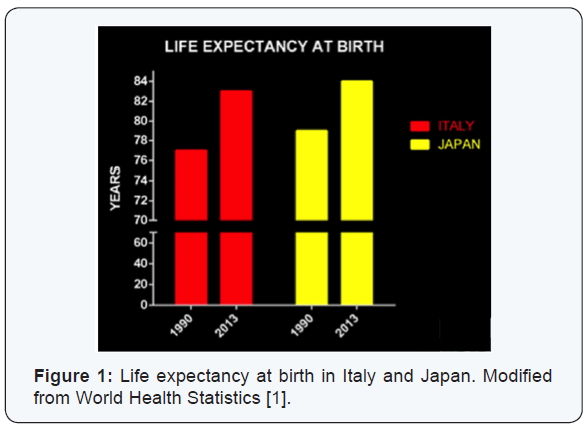
Other than good health systems, these two
countries share the cultural value of their diet and the consumption of
traditional food and this has been always considered important for
excellent physical and mental health preservation and to warrant
longevity.
Based on apparently diverse, though tasty, food
(i.e. pasta vs rice, olive olives soy, mozzarella cheeses tofu, wine vs
sake, basil vsshiso), these two diets share their prevailing, but not
exclusive, vegetal nature; Infact, fish and meet are also consumed, the
former but not the latter eaten mostly raw in Japan, the reverse being
true for Italy.
The vegetal pattern (highly rich in fruits and
vegetables) in conjunction with the low content in saturated fatty acids
(8% in energy value) of the Mediterranean diet, as described also in
its quantities by the recent revision of the alimentary pyramid (Figure
2), is considered the basis for reduced incidence of some degenerative
and cancer diseases and long life expectancy; its positive health impact
has been known since the sixties when it was first monitored among the
populations of Crete, other areas
of Greece and southern Italy [2] thus granting to the Mediterranean diet
the value of “first medicine”.
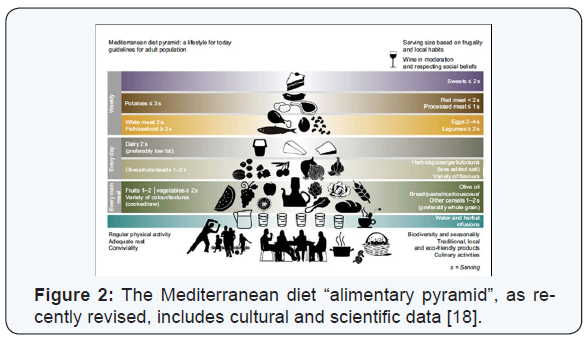
The mechanism underlying the positive health
impact of the Mediterranean diet has been the object of intense basic
and clinical researches; these have previously defined the chemical food
composition and, more recently, have identified the biologically active
ingredients in conjunction with their health properties (Table 1).
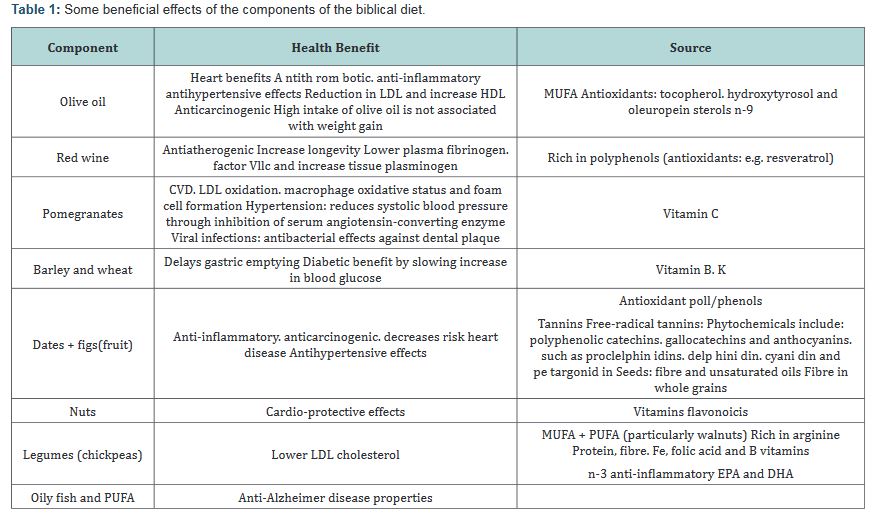
The wide variety (also chromatic) of fruits and
other vegetables (vegetables, herbs, cereals, etc) makes the
Mediterranean diet particularly rich in principles generally defined as
anti-oxidants, some of which endowed with important biological activity
and health properties preventive of human diseases sometimes serious.
Thus, for instance, the constant presence of the extra virgin olive oil
(EOO) in the Mediterranean diet plays a fundamental role, among other
mechanisms, for increasing the blood level of cholesterol HDL and
reducing the LDL, minimizing the cardiovascular risk, lowering blood
pressure, reducing platelet aggregation and inflammation, and displaying
anti-atherosclerotic activity. Altogether, these actions have been
attributed to the content of EOO in monounsaturated fatty acids (MUFA)
and to specific anti-oxidants (e.g. tocopherol, hydroxityrosol,
oleuropein, etc) able to counteract the detrimental impact of free
radicals on the cell [3].
Low to moderate red wine consumption while
eating, displays beneficial effects on health, similar to those of EOO,
attributed to the content of anti-oxidants (e.g. resveratrol)
responsible for reducing the production of endothelin (among the most
potent endogenous vasoconstrictors) [4]. Dilating the arterioles and
reducing platelet aggregation via nitric oxide production and, hence,
reducing the cardiovascular risk. The latter properties of red wine
underline the french paradoxupon which the mortality rate for myocardial
infarction in France is inversely related to red wine consumption
[4-6]. Of unique importance, though of recent acquisition, is the action
of specific components of the Mediterranean diet in the modulation of
fundamental neurobiological processes.
It is envisaged that adaptive mechanisms that
have allowed food acquisition and energy efficiency have operated a
great evolutionary pressure on the brain of the modern human being and
on the development of its cognitive abilities. Several paleontological
evidence suggest a direct relation between food availability and skull
dimension and support the notion that even small changes in diet
composition may impact negatively on fertility and survival [7]. Greater
brains in humanoids have been associated to the development of
abilities such as cooking, food acquisition, energy saving, upright
walking and running, activities demanding coordination of cognitive
functions centered upon food success [7].
Consumption of polyunsaturated fatty acids (PUFA)
n-3 is one of the most studied interactions between food and brain
evolution. Docosaexahenoic acid (DHA) is one of the most abundant PUFA
n-3 in neuronal membrane; mammalians are unable to synthesize DHA and
are entirely relianton diet content, mostly present in fish (salmon,
bleu fish etc). It has been proposed that access to DHA favored the
encephalization process of hominidis (Figure 3a), that is the growth of
the brain with respect to the body mass (archeological evidence support
the notion that hominids adapted themselves to fish consumption before
encephalization; [7].
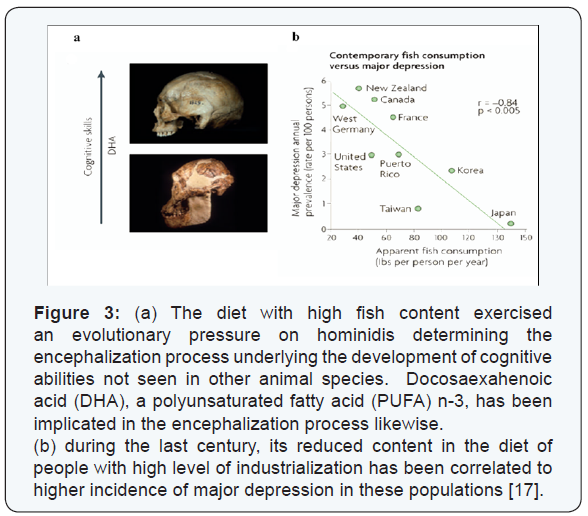
The relationship between brain and environment is
an always active process. During the last century, in highly
industrialized societies, increase in saturated fatty acids consumption
has been paralleled by reduction in PUFA n-3 (DHA) consumption and this
correlates with increased incidence of major depression in countries
like USA and Germany (Figure 3b)[7]. In industrialized countries,
enhanced survival rate due to socio-economic development is accompanied
by a parallel increase of age-related neurodegenerative diseases.
In fact, it is calculated that actually
46.800.000 individuals suffer of dementia worldwide; in Italy the
estimated figure is 1.241.000 (50% being of the Alzheimer type) due to
increase by 116% in the 2050 [8]. In the USA the cost for care is about
226 billion dollars, and this is paid out for its 30% directly by the
pocket of demented patients (Figure 4).
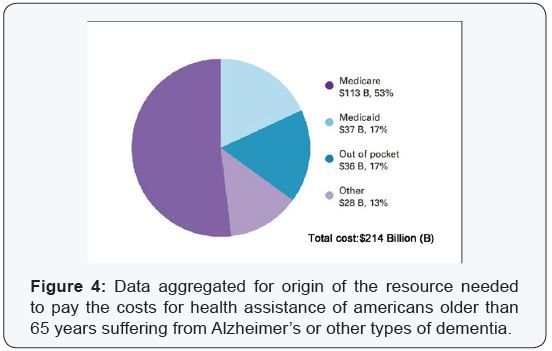
The neuron is highly vulnerable to the
detrimental effects of oxidative stress and antioxidants slow the aging
process and neuronal degeneration [9], this stimulated, during the last
two decades, a wealth of scientific researches with disappointing
results. In fact, clinical trials have failed to demonstrate measurable
efficacy over placebo of individual active principles (e.g. antioxidants
like Vit. E) in slowing down the cognitive decline and the degenerative
process in Alzheimer’s patients [10].
Nonetheless, these negative data do not undermine
the important role played by oxidative stress in age-related
neurodegenerative processes. Therefore, it is conceivable that long term
exposure through the diet to food endowed with high content of
antioxidants may slow down degenerative cellular processes linked to
aging. This hypothesis, in conjunction with the notion that the
Mediterranean diet is based on foods endowed with high amount of
antioxidants, has formed the rational for several clinical trials that
have yielded inconclusive results on the validity of the Mediterranean
diet. It is conceivable that the inconclusive nature of most of the
trials of the past stems from the poor trial design and from the lack of
markers with which to monitor the diet adherence.
Accordingly, in a cohort of aged subjects
selected and monitored rigorously recent experimental evidence shows
that adherence to the Mediterranean diet allows measurable results to be
achieved on cognitive decline. In a recent study published in June 2015
in the prestigious Journal of the American Medical Association [11] for
the first time 447 patients have been randomized and assigned to three
arms: 157 have been assigned to Mediterranean diet added with known
quantity of EOO, 147 to Mediterranean diet added with known quantity of
nuts and 145 assigned to control diet; 127, 112 and 95 individuals,
respectively, completed the study. Adherence to the diet has been
confirmed by monitoring blood markers. The yielded results demonstrate
unequivocally that adherence to the Mediterranean diet for a long period
(6 years) impacts positively on memory slowing down significantly the
cognitive decline vs control. Furthermore, the trial has shown a
positive, specific, effect of EOO on frontal lobe function and on global
cognitive function and a specific effect of nuts on different memory
forms evaluated using a validated clinical test [11].
Although the latter study does not clarify the
mechanisms underlying the effect of the Mediterranean diet on cognitive
decline, it is true that the content in antioxidants plays an important
role. It is widely demonstrated that DHA prevents den critic spine
degeneration in animal models of Alzheimer’s through activation of gene
products implicated in neuronal survival and inactivating those involved
neuronal death processes [12].
It is well established that drugs for Alzheimer’s
disease treatment are of low efficacy, act for a short period of time
and are active on cognitive symptoms only [13]. Unfortunately, short
after diagnosis, Alzheimer’s patients develop behavioral and
psychological symptoms such agitation and aggression, sometimes very
serious [14], insensitive to typical Alzheimer’s therapy, not fully
effective and un safely treated with antipsychotic drugs(including
atypical ones) that, indeed, enhance the risk of death [13].
Accordingly, a warning has been recently launched against the routine
use of narcoleptics in Alzheimer’s patients. Concomitantly, it has been
demonstrated that treatment of pain (it is calculated some 40-60%
sufferers) in Alzheimer’s patients (unable to report it) minimizes
serious behavioral and psychological symptoms (agitation, aggression,
etc) [15]. Incidentally, it has been reported that DHA reduces
experimentally induced chronic pain [16].
The knowledge that the Italian population,
likewise the rest of the world, is undergoing a fast progressing aging
process (actually, 900.000.000 of individuals over 60 are calculated
worldwide with an incremental trend from 22% in 2015 to36% in 2050 vs
the general population) accompanied by the dramatic figure of 46.800.000
demented people in the world and 1.241.000 in Italy recalls the huge
costs for this age-dependent neurodegenerative disease [14]. In
addition, it is mandatory to limit the damage inflicted to patients,
caregivers and society by ineffective therapy; indeed, it cannot be
postponed any longer the development of a novel strategy of cure built
on validated but novel scientific bases in the near future. The latter
concept is strengthened by negative results of clinical trials that
failed to demonstrate efficacy and safety also, but not exclusively, for
biotechnology based therapy of Alzheimer’s disease centered on beta
amyloid lowering.
These negative news drive to the huge investments
in conjunction with the large attrition in drug research and
development encountered recently by industry in this therapeutic area
[17].With this in mind, it is envisaged that additional public resources
should be invested in research including clinical trials addressing the
role of the Mediterranean diet in combating the cognitive decline,
minimizing pain symptoms and improving quality of life in Alzheimer’s
patients with consequent reduction of major behavioral and psychological
disturbances [18,19].
While the researchers will collect more data
regarding the mechanisms underlying the health benefits of the
Mediterranean diet under physiological and pathological states,
hopefully a healthy eating plan, adherent to the Mediterranean dietary
pattern, will be designed, adopted and suggested to the patients
routinely as part of a good clinical practice.
Conclusion
In conclusion, the Mediterranean diet could
reasonably represent at once the right test to prove the maturity of the
biomedical and health research system in Italy and to speed up
industrial development and market of the Italy trade mark, including
environment, agriculture, biodiversity, culture, tradition, etc in great
demand in Europe and worldwide.
For more articles in Journal of Anesthesia
& Intensive Care Medicine please click on:
https://juniperpublishers.com/jaicm/index.php
https://juniperpublishers.com/jaicm/index.php
Comments
Post a Comment